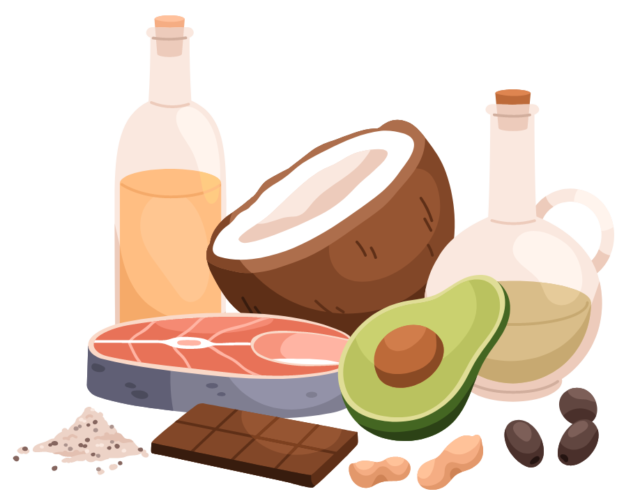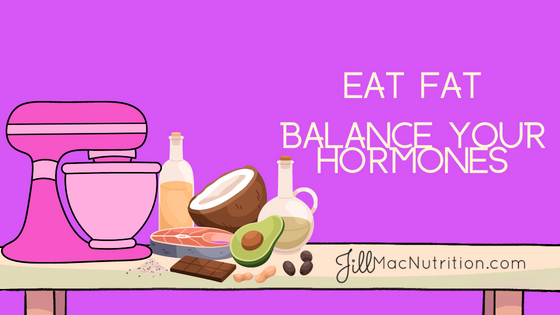Fat has been feared since the 1970s, when the low fat diet craze first came on the scene. It was blamed for heart attacks, high cholesterol and for making people fat. In the last decade or so, people have been coming around to the fact that this is simply not true. How can foods that we’ve eaten throughout all of human history suddenly be causing heart attacks? You’ll still find people today afraid of butter because they think it’ll clog their arteries, but you’ll also find people pounding tons of it daily since it came out that it’s actually not the cause for heart attacks. This is going from one extreme to the other. Where is the middle ground? Just like we needs carbs, we need fat. It is essential. But like all things, you want to be like Goldilocks – not too much and not too little.
What makes fat essential?
- It is an important component of the cell membrane (what our whole body is made of!)
- It helps to produce hormones
- It is needed for the body to absorb vitamins A, D, E and K
- It slows the absorption of food, which helps to keep blood sugar balanced
- It helps regulate body temperature
- It protects/insulates our vital organs
- It lowers your risk of developing cancer
- It makes food taste good
It’s important to consider that there are different types of fats and they have different effects on the body. The types of fats are saturated, monounsaturated, polyunsaturated and trans.
| Saturated | Monounsaturated | Polyunsaturated | Trans |
| -Highly stable, best for cooking -Do not go rancid easily -Solid or semi-solid at room temperature | -Somewhat stable, safe for low heat cooking -Do not go rancid easily -Liquid at room temperature | -Mostly unstable, not safe for cooking -Goes rancid easily -Usually liquid | -Man-made fat created by adding hydrogen to polyunsaturated fats to turn them from liquid to solid so they become more stable -Increases risk of atherosclerosis (hardening of the arteries)Increases blood cholesterol |
| Saturated | Monounsaturated | Polyunsaturated | Trans |
| -Butter/ghee -Milk/cream -Coconut oil/milk -Animal fats such as lard, tallow, duck fat, etc. -Cheese -Egg yolks | -Olive oil Avocado and avocado oil -Nuts and nut oils -Peanuts and peanut oil | -Canola oil Sunflower oil -Fish oil -Safflower oil -Corn oil -Seeds and seed oils -Flax | -Margarine -Hydrogenated oils |

Saturated and monounsaturated fats should be prioritized over polyunsaturated fats because they are more stable. Consuming rancid fats will have negative health effects, such as creating free radicals in the body. This can speed aging, cause hormone imbalance, and increase your risk of cancer. Polyunsaturated fats have also been shown to slow metabolic rate and cause weight gain. However, these effects can be mitigated by consuming polyunsaturated fats alongside vitamin E, beta carotene, sage, rosemary and/or thyme. On the other hand, saturated fats, especially coconut oil, increase your metabolic rate and aid in weight loss.
It will take some experimentation to determine the amount of fat that is right for you. All meals should contain protein, carbs and fat to be balanced, but the amounts of each will vary from person to person. Keep in mind that fat contains more than double the amount of calories as protein and fat, so it is very easy to overdo it. Everyone’s needs are different based on their past eating habits, current state of health, activity levels, age, goals, etc. A good starting place would be to eat foods that contain naturally occurring fats, rather than to add extra fat to foods. When using fat to cook with, use just enough to coat the pan and your veggies – no need to douse them or heavy pour! Play around and find what works best for your body!
Sources:
Humphries KM, Yoo Y, Szweda LI. Inhibition of NADH-linked mitochondrial respiration by 4-hydroxy-2-nonenal. Biochemistry. 1998 Jan 13;37(2):552-7. doi: 10.1021/bi971958i. PMID: 9425076.
How To Heal Your Metabolism by Kate Deering
See Also:
Saturated Fat is Actually a Health Food
